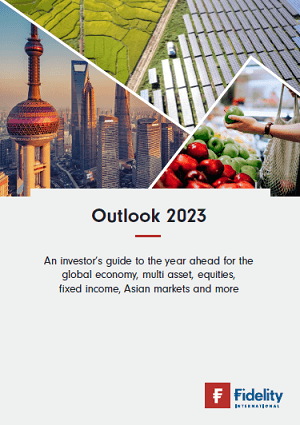Outlook overview
Markets want to believe that central banks will blink and change direction, negotiating the economy towards a soft landing. But in our view, a hard landing remains the most likely outcome in 2023. The previous norm of central bank “whatever it takes” intervention during the financial crisis and the pandemic is going or has gone.
Until markets absorb this fully, we could see sharp rallies on the back of expected action by the Fed, only for them to reverse when it doesn’t materialise in the way they expect. Rates should eventually plateau, but if inflation remains sticky above 2 per cent, they are unlikely to reduce quickly even if banks take other measures to maintain liquidity and manage increasingly challenging debt piles.
A key factor to watch is where the dollar goes from here. In 2022, the strong dollar has proved to be a wrecking ball for other economies, both in the developed world and for emerging countries that rely on hard currency debt. If the Fed continues to raise rates, an even stronger dollar could accelerate the onset of recession elsewhere. Conversely, a marked change in the dollar’s direction, potentially as its relative strength and confidence in monetary and fiscal policy making become an issue, could bring broad relief, and increase overall liquidity across challenged economies.
Other parts of the world are on different trajectories. Japan has so far maintained looser policy settings; but any shift away from its current yield curve control could lead to unintended consequences for the yen and potentially add another layer of risk to the already elevated levels of volatility in foreign exchange (FX) markets.
China too has taken a different pathway in 2022, thanks to its zero-Covid policy and the reining in of its property market. In the next 12 months, we expect policymakers to continue to focus on reviving the economy, investing in longer-term areas such as green technologies and infrastructure. Any loosening of Covid restrictions will cause consumption to pick up. The deglobalisation that has arisen from the pandemic and tensions with the US will take time to work its way through but is a theme that will grow.
In this Investment Outlook, our asset class experts consider how to navigate this unusual crisis-driven cycle in 2023. Emerging markets and Asian countries, with a weaker growth correlation with the US and Europe, present one way to increase diversification, while cash and quality investment grade securities offer defensive characteristics.
As the dispersion of returns increases, investors will be able to seek out idiosyncratic elements in their portfolios rather than rely on whole market moves to generate returns. Opportunities should also begin to emerge among securities driven by longer-term themes such as decarbonisation and reindustrialisation, which could draw investor attention sooner rather than later.
Download the full report
